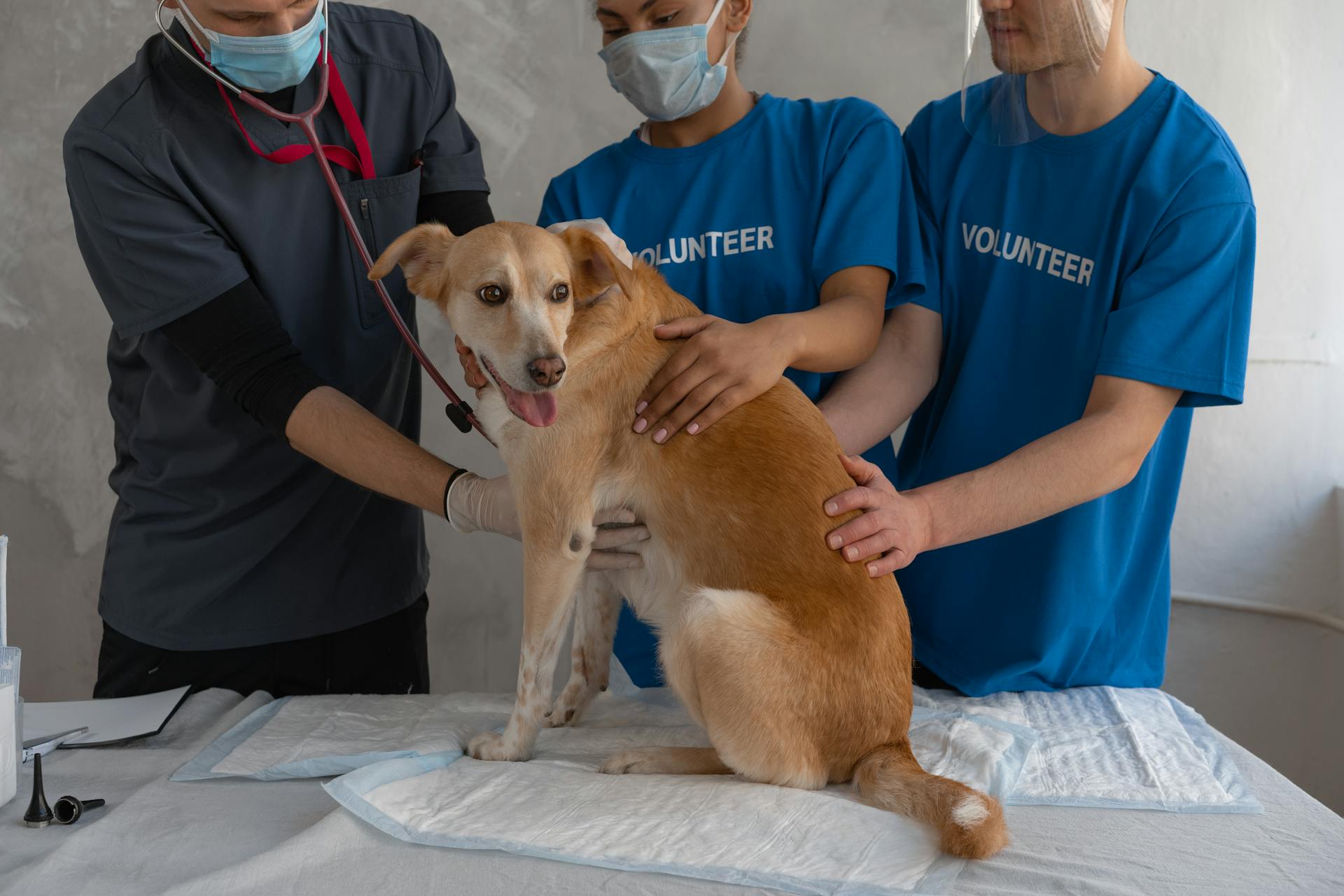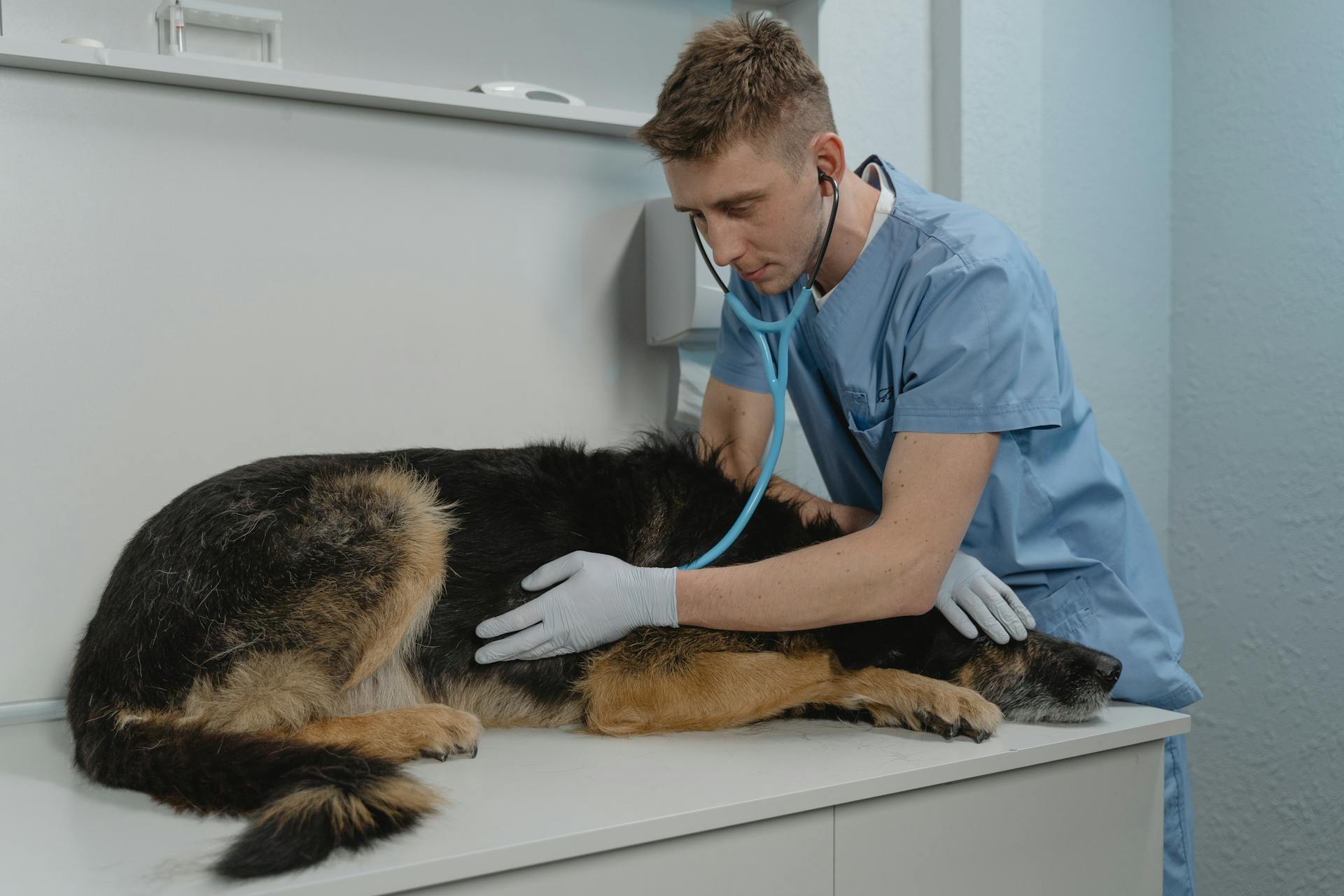
Kennel cough is a common respiratory infection in dogs, but it's not always a cause for alarm. According to the American Animal Hospital Association, kennel cough is a contagious cough that can be caused by the bacteria Bordetella bronchiseptica or the virus parainfluenza.
Symptoms of kennel cough can range from a mild cough to a severe, hacking cough that can last for weeks or even months. In some cases, the infection can lead to secondary complications, such as pneumonia.
While kennel cough is generally not a serious condition on its own, it can be a sign of a more underlying issue, such as a weakened immune system.
Readers also liked: Difference between Kennel Cough and Upper Respiratory Infection
Causes of Kennel Cough What Causes?
Kennel cough is caused by a combination of viral and bacterial factors.
Canine distemper, a viral cause, can lead to kennel cough, although it more commonly causes a full-blown distemper infection.
Canine parainfluenza is another viral cause that may result in kennel cough, but it's more likely to cause canine flu instead.
On a similar theme: Canine Distemper in Ferrets
Canine coronavirus, a different virus from the one causing human COVID-19, can also contribute to kennel cough in dogs.
If your dog is diagnosed with a viral cause of kennel cough, antibiotics won't be able to treat the condition.
Most dogs with kennel cough recover with proper care, but it can be a significant cause of distress for both the pet and the owner.
Symptoms and Diagnosis
Kennel cough is a process of elimination, so your vet will examine your pet for signs of other conditions that share similar symptoms, such as collapsing trachea, heartworm disease, bronchitis, asthma, cancer, heart disease, and more.
Coughing can also be a sign of canine distemper virus or canine influenza virus.
A thorough clinical examination is a crucial first step in diagnosing kennel cough, where your vet will evaluate your dog's overall health, ask about their recent history and symptoms, and listen to their lungs.
The characteristic kennel cough can often be provoked by gentle pressure on the dog's windpipe during this exam.
You might enjoy: Bone Stuck in Dogs Mouth
Symptoms

Symptoms can be quite varied, but one of the most common is a persistent cough that lasts for more than a week.
A cough that produces yellow or green mucus is a sign that the body is fighting an infection.
Shortness of breath can be a symptom of a more serious underlying condition, such as pneumonia.
Fatigue is another common symptom, which can be caused by a lack of sleep or a viral infection.
A fever over 102°F is a sign that the body is fighting an infection, but if it lasts for more than three days, it's a good idea to see a doctor.
Chills can be a symptom of a viral infection, such as the flu.
A sore throat can be caused by a viral or bacterial infection, and can be painful when swallowing.
Chest pain can be a symptom of a heart attack or pneumonia, and should be taken very seriously.
A headache can be a symptom of a viral infection, such as the flu, or a sinus infection.
On a similar theme: Can Kennel Cough Turn into Pneumonia
How Vets Diagnose
Diagnosing kennel cough is essentially a process of elimination. Your vet will examine your pet for signs of a collapsing trachea, heartworm disease, bronchitis, asthma, cancer, heart disease, and more, as these conditions share similar symptoms.
A thorough clinical examination is the first step in diagnosing kennel cough. The vet will evaluate your dog's overall health, ask about their recent history and symptoms, and listen to their lungs.
The characteristic kennel cough can often be provoked by gentle pressure on the dog's windpipe, also known as their trachea, during the examination. This can help the vet determine if kennel cough is the probable cause of your dog's symptoms.
Your vet will consider your pet's medical history and the results of their examination to determine whether kennel cough is the likely cause of their symptoms. This may involve ruling out other conditions that can cause similar symptoms, such as canine distemper virus or canine influenza virus.
Readers also liked: Preventative Care Keeping Your Pet Healthy Year-Round
Additional Diagnostic Tests

A vet may recommend additional tests to rule out other conditions or determine if there's an underlying disease that could be worsening your dog's symptoms.
A complete blood count (CBC) might be one of these tests, which can help identify any underlying infections or diseases.
Chest x-rays can also be recommended to get a clear picture of your dog's lungs and determine if there's any underlying respiratory issue.
A bacterial culture from the throat or nose might be taken to determine if your dog has a bacterial infection, which can be contributing to their symptoms.
These tests can help your vet get a more accurate diagnosis and develop an effective treatment plan for your dog.
Treatment and Recovery
Most dogs can recover from kennel cough on their own, but it's essential to provide a calm and stress-free environment to speed up the process. Supportive care measures like ensuring your dog is well-hydrated and nourished can make a big difference.
If your dog is a healthy adult, your veterinarian may instruct you to keep them comfortable and isolated, allowing the illness to run its course. This can take around one to two weeks, but it's crucial to schedule a follow-up appointment if symptoms persist.
In some cases, your veterinarian may prescribe antibiotics to prevent secondary infections or cough suppressants to give your dog relief from the continuous coughing. These medications can be a big help in managing symptoms.
During recovery, it's best to avoid using neck collars and opt for a body harness instead when taking your dog for walks. You can also use a humidifier in rooms where your dog spends most of their time to help alleviate symptoms.
Here's a quick rundown of what to expect during recovery:
- Most dogs recover within 1-2 weeks
- Avoid using neck collars and opt for a body harness instead
- Use a humidifier to help alleviate symptoms
- Schedule a follow-up appointment if symptoms persist
Prevention and Vaccination
The most effective treatment for kennel cough is actually prevention. Vaccinating your dog against canine parainfluenza, canine coronavirus, canine distemper, and Bordetella can prevent kennel cough entirely.
Vaccination is the most effective strategy to prevent kennel cough. Several vaccines, including injectable, oral, and intranasal forms, can protect against some of the most common organisms causing kennel cough.
Your vet can guide you on the best vaccination schedule for your pet. Just because your pet is vaccinated doesn't mean they can't get kennel cough, but it will help their immune system fight off a possible infection and prevent the course of disease from worsening.
Discover more: How to Prevent Twisted Stomach in Dogs
What to Do If Your Dog Is Sick
If your dog is sick, it's essential to take action quickly to prevent the spread of kennel cough. If your dog has kennel cough symptoms, isolation is key to preventing cross-contamination.
Assess the severity of your dog's symptoms before taking them to the vet. If your dog is in good overall condition and eating well, treatments are often not necessary. However, if your dog shows signs of breathing difficulties, is not eating normally, or is elderly or immunosuppressed, a visit to the vet may be necessary.
Additional reading: Is Kennel Cough Vaccine Necessary
If your dog has kennel cough, keep them away from other dogs and contact your vet for advice. Your vet may recommend isolating your dog from others and monitoring their condition, or bringing them in for an examination. It's crucial to take quick action to keep your pet and other dogs safe.
Your dog should be considered contagious for 2 weeks after the end of symptoms. Keep them away from dog parks and dog daycare centers during this time to prevent the spread of kennel cough.
Sneezing
If your dog is sneezing, it could be a sign of kennel cough, although sneezing and wheezing are less common symptoms than the goose honk cough.
Sneezing can be accompanied by other symptoms like a runny nose.
A persistent, non-productive cough, often described as sounding like a honking goose, is a more common symptom of kennel cough.
If you notice sneezing, it's essential to keep your dog away from other dogs to prevent the spread of kennel cough.
Remember, kennel cough is highly contagious, so quick action is crucial to keep your pet and other dogs safe.
Related reading: How Can You Tell If Your Dog Has Kennel Cough
Fever
Fever is a relatively rare symptom of kennel cough in dogs, but it can still occur.
Dogs with kennel cough may have a mild fever, but it's less common compared to other illnesses.
Dogs from Contracting
If your dog is showing symptoms of kennel cough, it's essential to take steps to prevent the spread of the disease.
You can take your dog to places they'll socialize, such as the park, kennel, or groomers, without worrying about kennel cough if you have them vaccinated against it.
The kennel cough vaccine, also known as the Bordetella vaccination, is commonly recommended for dogs that frequently socialize with other dogs.
However, it's worth noting that this vaccine doesn't offer 100% prevention, as kennel cough can be caused by various pathogens.
There are three forms of the kennel cough vaccine available: injection, nasal mist, and oral medication.
Your veterinarian will choose the most appropriate form of the vaccine for your pet.
To prevent kennel cough, keep your dog's vaccinations up to date, especially if you plan to board your dog or take him to a doggie daycare.
Here are some general guidelines for preventing kennel cough:
- Keep your dog's vaccinations up to date.
- Consider vaccinating your dog against kennel cough if they frequently socialize with other dogs.
- Choose the most appropriate form of the kennel cough vaccine for your pet with the help of your veterinarian.
What to Do If Your Dog Is Sick
If your dog is sick, it's essential to take action quickly to ensure their health and safety. If your dog is in good overall condition and eating well, treatments are often not necessary, but it's always best to consult with your veterinarian.
If your dog shows signs of breathing difficulties, is not eating normally, is elderly, or immunosuppressed, a visit to the veterinarian may be necessary. Your veterinarian will decide if your dog needs to be examined or not.
If your dog has kennel cough, it's crucial to keep them isolated from other dogs for 2 weeks after the end of symptoms. You should also avoid taking them to dog parks or dog daycare centers during this time.
For more insights, see: Is It Normal for Dogs to Burp after Eating
To make your dog more comfortable, you can remove their collar and use a humidifier to relieve the cough. If your dog is experiencing persistent coughing, antibiotics may be prescribed to prevent secondary infections, or cough suppressants can be given to provide relief.
Here are some key steps to take if your dog is sick:
- Assess the severity of your dog's symptoms before taking them to the veterinarian.
- Keep your dog isolated from other dogs for 2 weeks after the end of symptoms.
- Use a humidifier to relieve the cough.
- Remove your dog's collar and use a body harness for walks.
Frequently Asked Questions
When should you go to the ER for kennel cough?
Seek emergency veterinary care if your dog's kennel cough symptoms worsen or are accompanied by fever, loss of appetite, lethargy, or nasal congestion and discharge
Do I need to take my dog to the vet for kennel cough?
Most cases of kennel cough are mild and can be managed at home, but severe cases may require veterinary treatment. Consult your family veterinarian for guidance on the best course of action for your dog
What happens if you don't treat kennel cough?
If left untreated, kennel cough can lead to pneumonia, a potentially life-threatening condition. Seek veterinary care immediately if symptoms worsen or persist.
Will kennel cough go away on its own?
Yes, kennel cough can often resolve on its own, typically within three weeks, but treatment may still be necessary for a speedy recovery.
Sources
- https://vetmedcenterslc.com/blog/what-you-need-to-know-about-kennel-cough/
- https://veterinaryemergencygroup.com/blog/kennel-cough-in-dogs/
- https://www.charlotte.providencevets.com/site/blog/2023/06/15/kennel-cough-dog--symptoms-treatment-prevention
- https://www.vetetnous.com/en/blogue/chien-en/kennel-cough/
- https://www.rivergateveterinaryclinic.com/site/blog/2023/06/30/what-is-kennel-cough-in-dogs-symptoms-treatment--prevention
Featured Images: pexels.com


